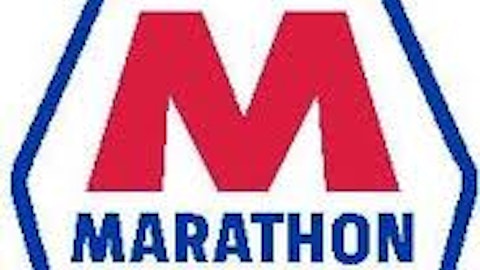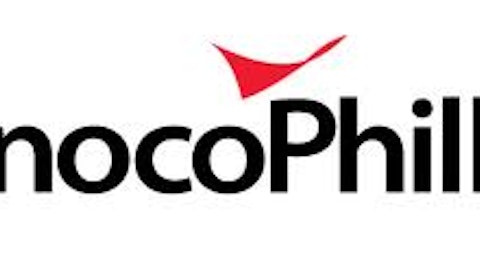Marathon Oil Corporation (NYSE:MRO) holds a 16% working interest in Waha’s operations. Production in Libya ceased in the first quarter of 2011, and operations there didn’t resume until the fourth quarter of that year. Despite the nearly year long shutdown, Marathon Oil’s 2011 net income was $2.95 billion, representing an increase of 15% over 2010.
About 20% of Hess’ total reserves are located in Africa. Luckily, it only has an 8% interest in the Waha Concession. Its production there the year before the civil unrest averaged 23,000 barrels of oil equivalents per day. That figure dropped to just 4,000 BOED during the civil unrest of 2011.
ConocoPhillips holds a 16.3% interest in the Waha Concession. In 2011, the company reported an average of only 8 million barrels of oil equivalents per day in that region. Production was back up to normal throughout 2012, and it was able to produce an average of 43 MBOED. ConocoPhillips is far less exposed to instability on the African continent compared to Hess and Marathon Oil. At end of fiscal year 2012 just 4.6% of the company’s total reserves were located there.
Marathon Oil Corporation (NYSE:MRO) is an international player with about 30% of its total proved reserves in Africa, and the rest in Europe and North America. The geographic distribution of its assets hardly represent its overall exploration and production operations. Nearly all of its E&P segment currently operates within the U.S. In 2012, only seven of its 202 wells under development were outside of the U.S. This means that in a worst case geopolitical scenario, the company might suffer some long-term asset writedowns, but would still be able to meet its short-term liabilities.
Opportunity:
Exports from the U.S.
The U.S. ban on crude oil exports dates back to the 1970s. Tensions in the Middle East, and the resulting oil crisis, were a rude awakening to the U.S.’s dependence on imported fossil fuels. Now that U.S. output is expected to out-pace that of Saudi Arabia, the export ban is beginning to seem unnecessary, or at least ready for some modifications. Vulnerability to global energy prices has been ingrained in the American psyche for decades, but that could all change. If the U.S. oil lobby has its way, the Congress may lift, or at least modify the ban on oil exports.
In the meantime, ultra-light crude, often referred to as condensate, can circumvent the crude oil export ban. In the past, condensate was typically sent to traditional refineries and added to heavier crude oil. Now, condensate is helping struggling producers circumvent the export ban. Special processing units, called splitters, cheaply split condensate into industrial feedstocks and kerosene. The feedstocks are used for a diverse range of products from plastics to paints. The kerosene is used for building loopholes in outdated policies.
Fortunately, there isn’t a ban on exporting kerosene. The cheaply produced fuel is sold to international markets, where it demands a much higher price. It isn’t much, but it might be enough to keep Marathon Oil’s condensate rich Eagle Ford assets profitable until the Congress does something about the U.S. energy glut.
Threat: Domestic over production
In my opinion, the greatest threat to Marathon Oil in the upcoming decade is the increasing production of oil and natural gas throughout the U.S. Horizontal drilling and hydraulic fracturing have resulted in a reversal of the Brent-WTI spread mentioned earlier. Cheap domestic oil and gas might be wonderful for Marathon Petroleum, but profit margins are getting squeezed tighter than ever for Marathon Oil’s North American producing assets.
Advanced extraction techniques might have started in the U.S., but it isn’t the only country with enormous shale reserves. If the Congress doesn’t at least modify the crude oil export ban soon, the Brent-WTI spread could erode before Marathon Oil has an opportunity to profit from it.
The article Congress Holding Marathon Oil’s Future in its Hands originally appeared on Fool.com.
Copyright © 1995 – 2013 The Motley Fool, LLC. All rights reserved. The Motley Fool has a disclosure policy.




